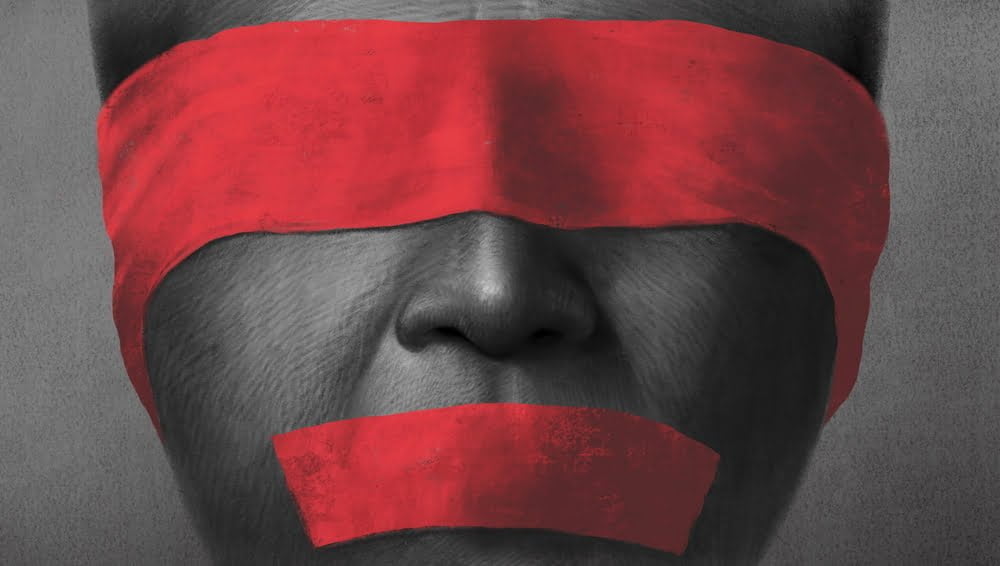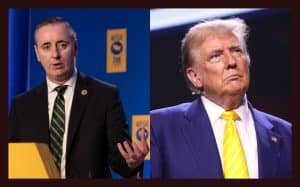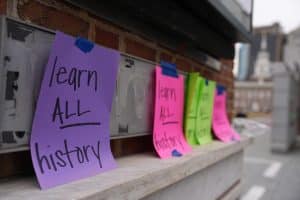Pennridge School District has proposed a new policy on student expression that has legal experts sounding the alarm, calling the proposal “extreme” and “unconstitutional.”
The policy seeks to drastically limit student speech and expression and restrict the dissemination of non-school materials. This would include any “verbal, written, technological, or symbolic representation or communication,” as well as any “printed, technological, or written materials” that have not been pre-approved by school officials, per the policy. Some examples of potentially prohibited non-school materials range anywhere from fliers and posters to messages on online forums or digital bulletin boards.
Since the language of the policy is so vague and overbroad, however, it doesn’t specify which types of speech, expression, or non-school materials would be deemed inappropriate and prohibited by the school district. As a result, many parents and advocacy groups are expressing outrage over this proposed policy, calling it a form of censorship. In fact, legal experts claim that this policy could very well violate Tinker v. Des Moines Independent Community School District — the Supreme Court case that cemented students’ free speech rights in public schools.
READ: Pennridge Diversity Meeting Meltdown Demonstrates Why DEI Is Desperately Needed
The 1969 landmark decision ruled that students do not lose their First Amendment rights at the schoolhouse gate, as long as their speech and expression doesn’t disturb classes and school activities. At the center of the case was Mary Beth Tinker, a 13-year-old girl from Des Moines, Iowa, who wore a black armband to school to protest the Vietnam War. After being called into the principal’s office, Tinker was suspended from school for violating the school district’s ban on armbands — a ban that was deliberately and preemptively passed to stifle student expression and quell any public displays of anti-Vietnam War sentiment at school.
By the end of the school week, four other students in the school district had been suspended for the very same thing. At the time, these suspensions were considered controversial enough to make the front page of the local newspaper, The Des Moines Register, prompting school board President Ora Niffenegger to defend the ban as a disciplinary measure against a “disturbing influence” at school.
Despite this controversy, the school board ultimately decided to maintain the ban, a decision that was later upheld in an Iowa Districting Court ruling. The case was then appealed to the Supreme Court, which ruled in favor of students’ First Amendment rights. In a 7-2 decision, the majority held that students still retain their constitutional rights to free speech and expression at school. In other words, teachers and school officials cannot legally censor students for their self-expression or political opinions simply because they disagree with the message.
The policy on student expression that the Pennridge School Board is currently considering, however, would essentially violate this decision, according to Maura McInerney, the legal director of the Education Law Center of Pennsylvania.
“I think it’s important to underscore that Tinker v. Des Moines was a landmark ruling that held that the First Amendment applies to public schools, and school officials can’t censor students’ speech unless it materially disrupts the functioning of the school,” McInerney told the Bucks County Beacon, calling Pennridge’s proposed policy “completely overbroad” and an “extreme example of preemptively precluding” free speech. “On its face, it violates the First Amendment protections guaranteed to students and the case law that has interpreted that right.”
McInerney says that the policy would also violate Mahanoy Area School District v. B.L., a 2021 Supreme Court decision that held that school officials cannot regulate or discipline students for off-campus speech. Since Pennridge’s proposed policy applies not only on school property, but also at any time or location when using electronic devices owned, provided, or sponsored by the school district to send messages or information, the policy would also extend to off-campus speech, which would expressly violate the Mahanoy decision.
According to Vic Walczak, the legal director of the ACLU of Pennsylvania, the overbroad nature of the policy is what makes it so extreme and unlike anything he’s ever seen before. While other school districts in the county and state have instituted sweeping book bans, like Central Bucks School Distrtict, Walczak says that Pennridge’s proposed policy is “even worse” because it goes one step further and seeks to directly censor students’ speech and expression and impede their ability to engage with one another.
READ: The Bucks County Courier Times Fails Readers With Its Book (Banning) Policy Editorial
“By having these vague terms and having it apply to such a huge amount of content, anything that’s not pre-approved by the school, that’s not part of that curriculum, gives them the latitude to apply this in arbitrary and discriminatory ways,” Walczak told the Bucks County Beacon.
As currently written, the policy would impose significant restrictions on what students can do and say to each other and how they can express themselves, he says. Whether it’s bringing a book to school or showing someone a picture on your phone, what students would be allowed to show, distribute, and disseminate would be severely limited, which would make it virtually impossible for students to not violate it almost every day in one way or another.
As a result, Walzcak says that it’s unlikely that school officials will punish every single student that technically violates the letter of the policy. However, some students are certainly going to be more affected than others. “The danger is that when you make everything illegal, and then you selectively apply it, then what you end up doing is prohibiting the materials that you just don’t like,” Walzcak explained. “And that is the most extreme form of censorship, and it’s called viewpoint-based censorship,” which has been deemed unconstitutional by several Supreme Court cases.
In addition, both McInerney and Walczak are concerned that the policy would disproportionately impact marginalized students and anyone who finds themselves on the wrong side of the school district. “Given some of the discussions at the board [meeting] and comments about the materials they like and don’t like, I think there’s a significant fear that this is going to be used against students of color, and it’s going to be used against the LGBTQ+ community,” Walczak said.
During a recent Pennridge School Board meeting on August 1, school board President Joan Cullen said that putting up rainbow stickers on school bulletin boards to show support for LGBTQ students would somehow exclude students of faith because both the symbol and its significance are supposedly “anti-Christian.” Another policy proposed by the school board restricting advocacy or political activities even specifically highlighted the discussion of gender identity as a form of advocacy that could be prohibited.
This type of anti-LGBTQ sentiment would not only limit students’ self-expression, but also negatively impact LGBTQ students’ mental health, especially transgender, nonbinary, and gender-nonconforming students. A 2018 study published in the journal Pediatrics found that trans students face higher rates of mental illness and are more likely to report feeling unsafe at school. However, providing safe spaces at school and creating affirming environments that promote acceptance and inclusion can help trans students feel safe and better connected to their peers and the greater school community.
McInerney is also worried that such a policy could impact students’ discussions of race and racism in school, noting that this is all not simply happening “in a vacuum,” but in conjunction with a broader book ban proposed by the school district, which overwhelmingly targets books by and about people of color, as well as LGBTQ-themed books. All in all, such a policy would essentially deny students the opportunity to engage in self-expression, share ideas and information, and connect with their peers. “In my view, it actually undermines the very purpose of educating students: to ensure that they’re critical thinkers, that they value the exchange of ideas, that they have these skills and tools to participate in the democratic process,” she said.
These sentiments are shared by both Will Creeley, the legal director of the Foundation for Individual Rights and Expression (FIRE), and Chris Finan, the executive director of the National Coalition Against Censorship, who released a joint letter to the Pennridge school board and superintendent’s office on Thursday, condemning the policy for its potential to violate to Tinker v. Des Moines and other subsequent cases dealing with students’ constitutional rights to free speech.
In the letter, Creeley and Finan called the policy an “ill-considered intrusion” on First Amendment rights that would “impose unconstitutional restrictions on student expression both on and off campus” and criticized the possible motives behind the proposal. “We recognize this policy has been introduced in a fraught political moment and against the backdrop of a national effort to remove works dealing with race, sexuality, and other charged topics,” they wrote. “We therefore caution that if the policy’s unstated aim is to shield students from the offense or discomfort that may arise when encountering a novel, dissenting, or simply unpopular viewpoint in written material from outside of the District’s prescribed curriculum, it is both unlawful and misguided.”
As a matter of fact, it’s so unlawful that the ACLU of Pennsylvania is already gearing up for a legal battle. The ACLU has a long history of championing students’ free speech rights, according to Walzcak, and is thoroughly prepared to sue the school district if this broad and discriminatory censorship policy is eventually passed and implemented by the school board. “They’re on very tenuous legal grounds. Once they start censoring kids, and we get a complaint, they’re likely to end up in federal court,” he said.
The school board is scheduled to a hold another meeting to discuss the policy on Monday.







